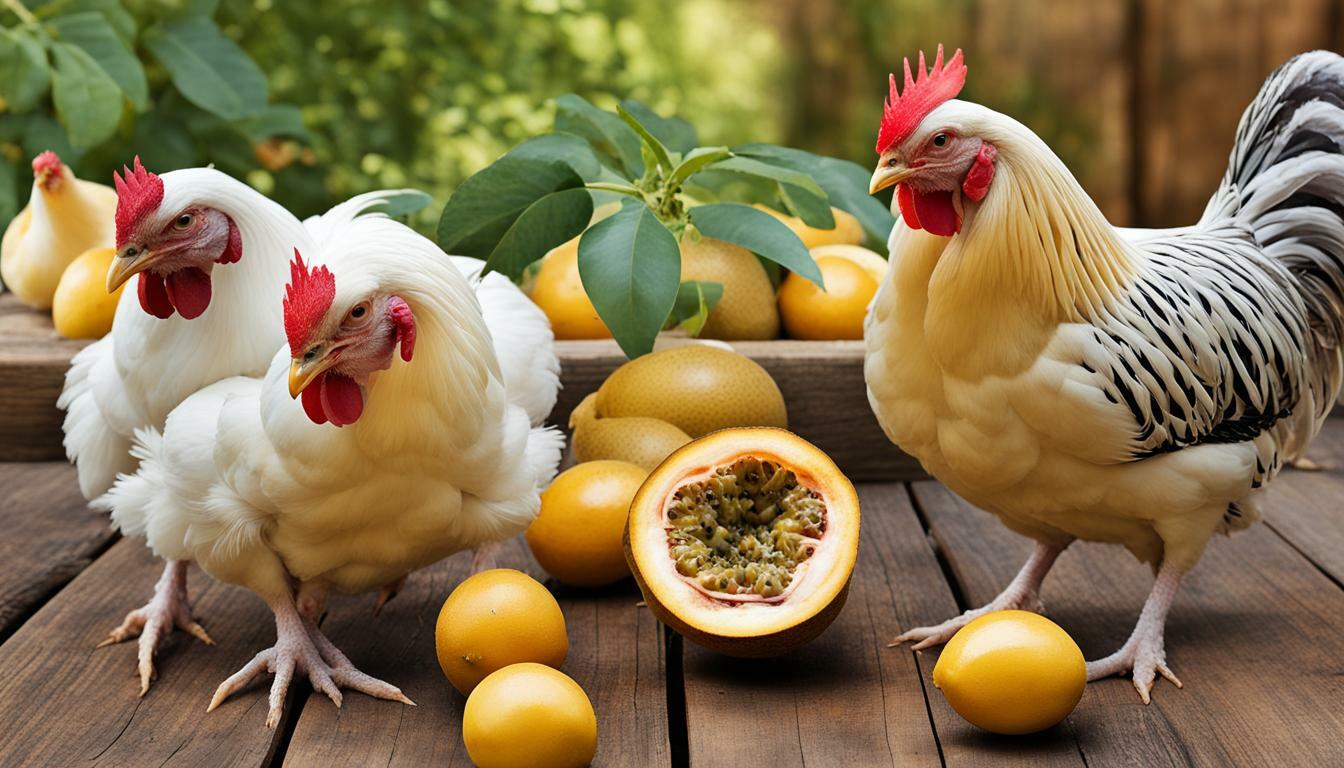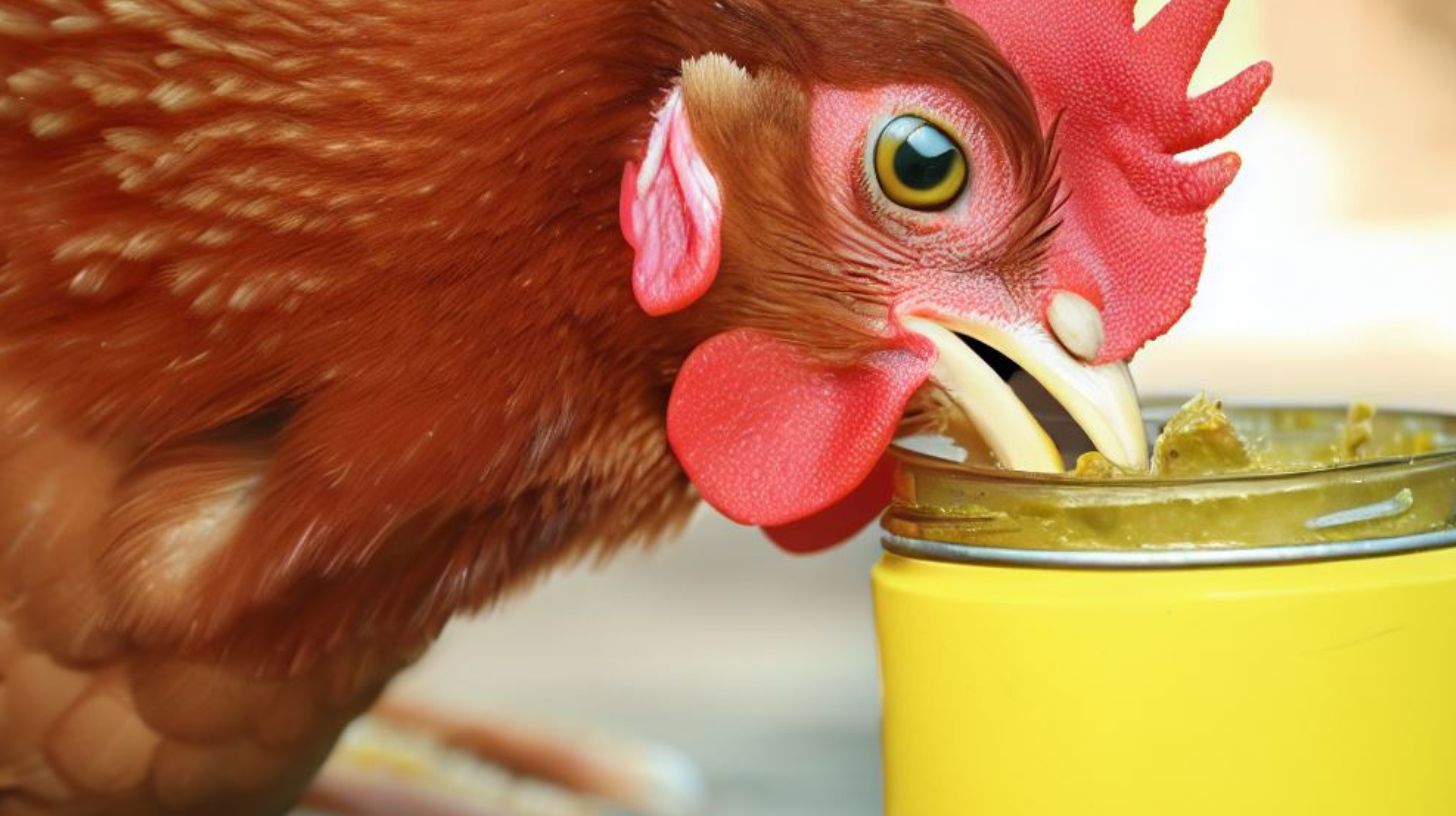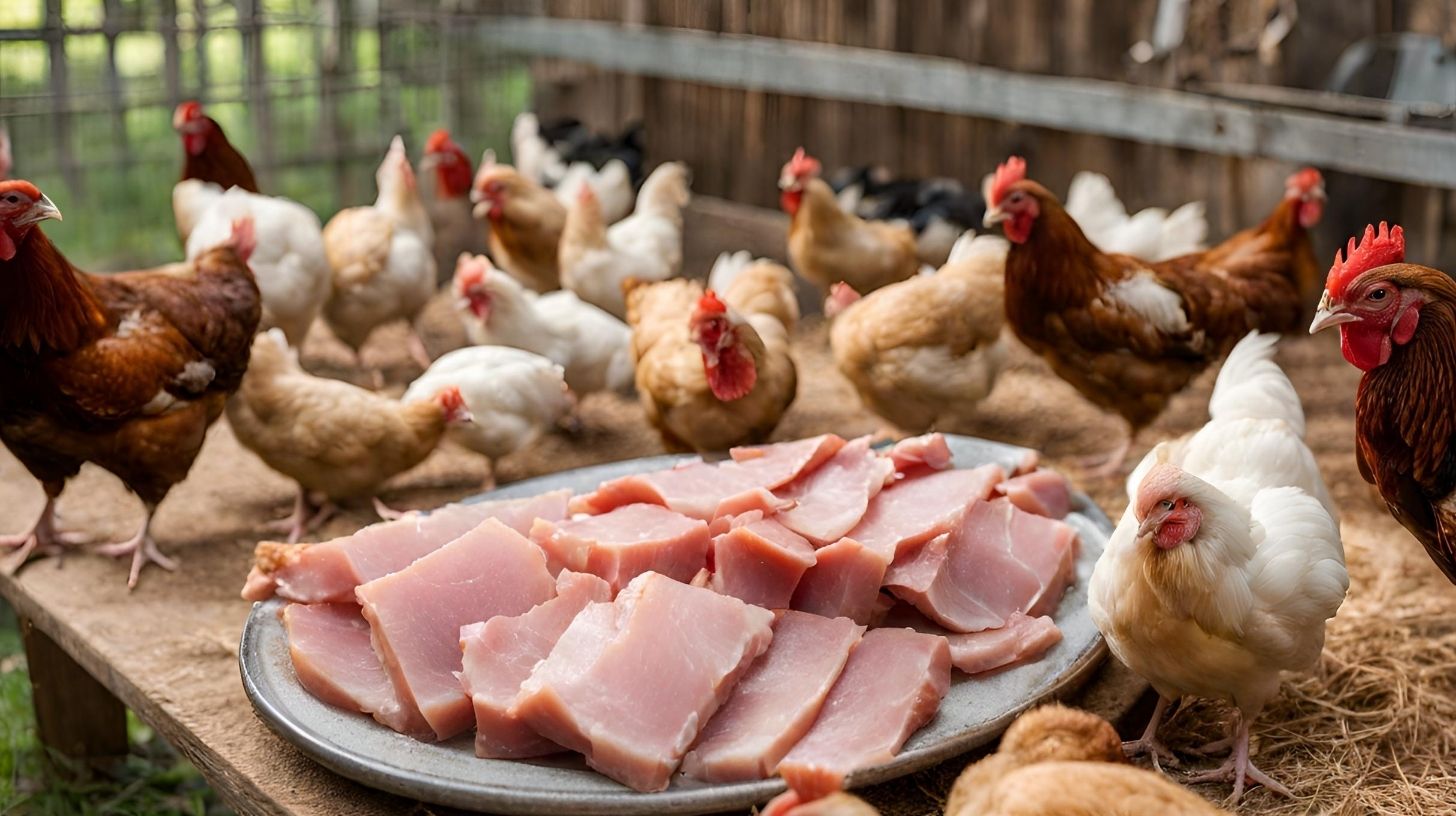Can Chickens Eat Passion Fruit? Find Out Here!

Table of content:
- What is Passion Fruit?
- Can Chickens Eat Passion Fruit?
- What are the Benefits of Feeding Passion Fruit to Chickens?
- What Parts of the Passion Fruit Can Chickens Eat?
- How Much Passion Fruit Can Chickens Eat?
- Are Passion Fruit Seeds Safe for Chickens?
- Is Passion Fruit Good for Chickens?
- How Often Can You Feed Passion Fruit to Chickens?
- What are the Best Ways to Prepare Passion Fruit for Chickens?
- Should You Remove the Seeds Before Feeding Passion Fruit to Chickens?
- Are There Any Precautions With Feeding Passion Fruit?
- Do Chickens Like Eating Passion Fruit?
- Can Chickens Eat Passion Fruit Peels and Vines?
- Final Thoughts
Passion fruit is a vitamin-rich tropical fruit that can provide many benefits when fed to chickens in moderation. This article will explore all the key questions chicken owners have about feeding their flock passion fruit.
What is Passion Fruit?
Passion fruit comes from tropical vines that produce egg-shaped fruits with a tough rind and juicy, seed-filled pulp. There are two main types – purple and yellow.
Passion fruit has a sweet yet acidic taste and an enticingly aromatic fragrance when ripe. The fruits contain high amounts of antioxidants, vitamins, minerals, fiber, and other beneficial plant compounds.
Can Chickens Eat Passion Fruit?
Yes, chickens can safely eat passion fruit. Both the pulp and seeds provide important vitamins, minerals, and antioxidants that contribute to your flock’s health.
Passion fruit is not toxic to chickens. The main concerns are overfeeding and choking hazards from the large seeds. As long as you feed passion fruit in moderation, it can be a healthy supplement to your flock’s diet.
What are the Benefits of Feeding Passion Fruit to Chickens?
Passion fruit has a unique nutritional profile that makes it a great occasional treat for chickens. Here are some of the main benefits:
- High in vitamin C, vitamin A, and potassium which support immune health and organ function
- Excellent source of dietary fiber from the pulp and seeds
- Contains antioxidants like carotenoids and flavonoids that reduce inflammation and cell damage
- Natural sugars provide an energy boost
- Aids digestion and gut health with pectin, cellulose, and insoluble fiber
- Helps provide variety and enrichment to prevent boredom in confined chickens
The pulp, juice, seeds, and even the rinds offer nutrients when fed safely. This makes every part of the passion fruit useful for chickens.
What Parts of the Passion Fruit Can Chickens Eat?
Chickens can eat all parts of a ripe passion fruit in moderation:
- Pulp – Soft interior flesh with juice and seeds. An excellent source of vitamins, minerals, fiber, natural sugars, antioxidants, and moisture.
- Seeds – Hard, indigestible seeds that provide insoluble fiber. Help clean crop and gizzard when eaten in small amounts.
- Rind – Tough outer skin that contains fiber. Can be fed after washing thoroughly.
- Leaves and vines – Passion fruit leaves and vines can also be fed. Ensure they have not been treated with chemicals.
Avoid feeding unripe green passion fruits. Always peel off any stickers or tags before feeding the fruit to your flock. Rinse passion fruits to remove any debris, dirt, or pesticide residues.
How Much Passion Fruit Can Chickens Eat?
Chickens can eat passion fruit 1-2 times per week as an occasional treat. Limit portion sizes to:
- 2-3 passion fruits per standard sized chicken
- 1/2 passion fruit for bantam breeds and chicks
Do not allow over consumption as excess passion fruit can cause loose droppings. Always provide fresh water when feeding high moisture fruits.
Spread out feeding over multiple days rather than offering a large quantity at once. Remove any uneaten pieces within 12 hours to prevent spoilage.
Are Passion Fruit Seeds Safe for Chickens?
Yes, passion fruit seeds are safe and healthy for chickens to eat. The seeds provide insoluble fiber that promotes digestion and gizzard function.
The main risk is potential choking if the seeds are swallowed whole. Chickens that bolt their feed may gulp the large seeds before properly breaking them down.
To prevent choking hazards:
- Cut large passion fruits into smaller pieces before feeding
- Crush the fruits lightly to expose the seeds
- Remove only the largest seeds from very small breeds
- Supervise feeding time for the first few servings
This allows the seeds to pass safely through the digestive tract.
Is Passion Fruit Good for Chickens?
Passion fruit is highly nutritious and can be an excellent supplement for chickens. The fruits provide:
- Vitamins A, C, riboflavin, niacin, iron, phosphorus, calcium, and carotenoids
- Antioxidants including beta-carotene, lycopene, and cryptoxanthin
- Natural sugars for quick energy
- Prebiotics and fiber to support healthy digestion
- Juice and pulp for added hydration
In particular, the vitamin C content helps boost chickens’ immune systems and overall health. The antioxidants protect against cell damage from free radicals.
The fiber cleans out the crop and gizzard to prevent compacted feed. This promotes good digestive health and function.
Just be sure not to overdo the sugary treats, and always feed passion fruit in moderation along with a complete feed.
How Often Can You Feed Passion Fruit to Chickens?
Limit passion fruit to 1-2 times per week as an occasional treat. Chickens do not require fruit daily to remain healthy. Too much can lead to loose droppings, diarrhea, or overly acidic digestion.
Fruits are safest when fed as only 10% or less of the total diet. Spread out passion fruit servings with 2-3 days in between for the best results.
Offer fruits in the morning on empty crops or as incentives during training sessions. This prevents passion fruit from fermenting in the crop overnight.
Pull out any uneaten pieces within 12 hours as the sugars will quickly ferment in the heat. Always provide plenty of fresh, clean drinking water whenever feeding fruits.
What are the Best Ways to Prepare Passion Fruit for Chickens?
Here are some preparation tips:
- Wash thoroughly under running water to remove dirt and residues
- Cut larger passion fruit in half or quarters to expose the pulp and seeds
- Scoop the pulp into a shared dish – the peel can also be fed
- Lightly crush fruits to break down the tough outer rind
- Remove only extremely large or hard seeds for small chicks
- Mash pulp or chop peel into smaller pieces for young chicks
- Mix passion fruit pieces into a shared fruit salad with other tropical fruits
- Sprinkle diced passion fruit over a small amount of scratch, pellets or treat to encourage foraging
Avoid adding milk, yogurt, or other high fat ingredients that can cause digestive upset. Always supervise the first few times you offer new fruits.
Should You Remove the Seeds Before Feeding Passion Fruit to Chickens?
Removing all the seeds is unnecessary for standard sized chickens breeds. The seeds provide beneficial fiber, nutrients, and enrichment. Scooping out some of the larger seeds helps reduce chances of choking for bantams or chicks.
The seeds also contain anti-fungal compounds that support digestive health. Allowing some seeds to pass to the gizzard mimics natural foraging behavior.
Simply monitor your flock as they try passion fruit for the first time. Crush lightly or cut to expose the seeds. If any birds seem to struggle swallowing the seeds whole, then remove more of them before serving.
Are There Any Precautions With Feeding Passion Fruit?
Feed passion fruit in moderation to avoid:
- Digestive upset – Too much fruit sugar can cause loose droppings. Start with small servings.
- Crop impaction – Large seeds may not pass quickly enough from the crop to gizzard. Crush passion fruits or cut into smaller pieces before feeding.
- Choking – Mostly a risk in smaller breeds like bantams or chicks. Supervise initial feedings and break down fruits to reduce choking hazard.
- Food waste – Remove any uneaten fruit within 12 hours as the sugars will quickly ferment.
Always feed passion fruit as a supplemental treat, not a daily diet staple. Rapid diet changes can disrupt digestion. Introduce new fruits slowly and watch for any signs of reactions.
Do Chickens Like Eating Passion Fruit?
Most chickens love eating juicy, sweet passion fruit! The smell attracts their attention, and the taste provides satisfying sugars.
Chickens relish exploring new foods thanks to their foraging instincts. The seeds provide opportunities for scratching and pecking.
The natural sugars make passion fruit an excellent reward for training. Chickens become very motivated to perform tricks or commands for a tasty treat!
To encourage hesitant chickens, mix a few diced passion fruit pieces into their regular feed. The curiosity of flockmates eating the fruit often convinces the shy chickens to try it.
Can Chickens Eat Passion Fruit Peels and Vines?
Yes, chickens can eat passion fruit peels and vines in addition to the pulp. The peels provide insoluble fiber that promotes digestive health.
Ensure any peels are washed thoroughly and diced into small pieces. Remove stickers or tags which could cause choking hazards.
The leaves and vines provide nutrients if harvested from plants grown without pesticide use. Introduce them slowly as the high fiber content may cause loose droppings if overfed.
Always supervise the first few times you offer new foods. Remove any uneaten vines within 12 hours to prevent molding.
Final Thoughts
Passion fruit is a nutritious fruit that offers many benefits for chickens’ health when fed properly. The vitamins, minerals, antioxidants, and fiber support digestion, immunity, and overall condition.
Chickens can safely eat all parts of the passion fruit – pulp, seeds, rind, leaves, and vines. Just be sure to introduce treat-sized servings slowly and monitor for any signs of digestive upset.
By following proper feeding guidelines, passion fruit can provide a delicious and healthy supplement to your flock’s daily diet. The tropical taste will add enrichment and variety to brighten up any chicken’s day!
Welcome. I’m Adreena Shanum, the proud owner of this website, and I am incredibly passionate about animals, especially poultry. I founded adreenapets.com as a labor of love, stemming from my desire to share my knowledge and experiences with poultry enthusiasts worldwide.




